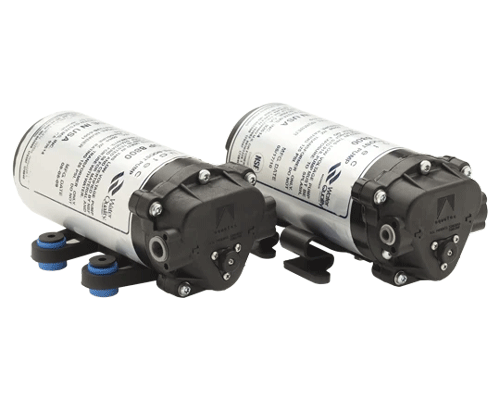Product added to cart
- Home
- Pure Water Blog
- Do You Need a Booster Pump for Your RO System? A Comprehensive Guide
Do You Need a Booster Pump for Your RO System? A Comprehensive Guide

If you're considering installing a reverse osmosis (RO) system in your home or workplace, you may have come across the term "booster pump." But what exactly is a booster pump, and do you really need one for your RO system? In this article, we'll delve into the world of RO systems and explore whether a booster pump is necessary to optimize its performance. Read on to discover the benefits, considerations, and factors to help you make an informed decision.
Section 1: Understanding Reverse Osmosis (RO) Systems
To fully comprehend the role of a booster pump, it's essential to understand the basics of RO systems. Reverse osmosis is a water purification process that removes contaminants, impurities, and undesirable substances from water by utilizing a semi-permeable membrane. RO systems are known for their effectiveness in producing clean and great-tasting water.
Section 2: What is a Booster Pump?
A booster pump is an additional component that can be installed in an RO system to increase water pressure. It is particularly useful in situations where the incoming water pressure is low, as low pressure can affect the efficiency and performance of the RO system.
Section 3: Benefits of Using a Booster Pump
3.1 Enhanced RO System Performance: One of the primary benefits of using a booster pump is that it improves the overall performance of your RO system. By increasing water pressure, it helps to optimize the filtration process and ensures a steady flow of purified water.
3.2 Faster Water Production: Low water pressure can result in a slower water production rate. With a booster pump, the water flow rate is significantly increased, reducing the time it takes to fill up storage tanks and providing you with a reliable supply of purified water.
3.3 Improved Water Quality: Proper water pressure ensures that the RO membrane is effectively eliminating impurities from the water. A booster pump helps maintain consistent pressure, allowing the membrane to function optimally and deliver high-quality purified water.
Section 4: Factors to Consider
4.1 Incoming Water Pressure: Before deciding on a booster pump, it's important to assess the incoming water pressure. If your water pressure is consistently low, a booster pump is likely to be beneficial. However, if your water pressure is already within the recommended range for RO systems, a booster pump may not be necessary.
4.2 RO System Capacity: Consider the size and capacity of your RO system. Larger systems with higher production capacities may require a booster pump to ensure adequate water pressure throughout the filtration process.
4.3 Energy Consumption: Booster pumps require electricity to operate. It's crucial to evaluate the additional energy consumption and its impact on your utility bills. However, modern booster pumps are designed to be energy-efficient, so their impact on your overall energy usage might be minimal.
Section 5: Installation and Maintenance Considerations
5.1 Professional Installation: Installing a booster pump requires technical knowledge and expertise. It is recommended to have a professional plumber or RO system technician handle the installation process to ensure proper configuration and performance.
5.2 Regular Maintenance: Like any component of an RO system, booster pumps require regular maintenance to sustain their efficiency. This includes periodic checks, cleaning, and potential replacement of parts. Ensure you follow the manufacturer's guidelines and schedule maintenance as necessary.
Conclusion:
While a booster pump is not an essential component for every RO system, it can significantly improve performance in situations where the incoming water pressure is low. By enhancing water pressure, a booster pump ensures faster production, improved water quality, and optimal functioning of the RO membrane. Before making a decision, consider factors such as incoming water pressure, system capacity, and energy consumption. Consulting with a professional can help determine whether a booster pump is necessary for your specific requirements.
Tags:
Where should I install my RO booster pump?
What is the role of booster pump in RO system?
water quality
water pressure
reverse osmosis
maintenance tips
installation considerations
How do you fix low water pressure in a RO system?
How do I increase water pressure in my RO system?
How do I increase the pressure on my RO booster pump?
enhanced performance
Do I need a booster pump for my RO system?
booster pump for RO system
Recent Posts
February 02, 2024
What's the Normal TDS for Drinking Water?
February 02, 2024
Unveiling the Most Accurate TDS Meter: Your Guide to Crystal-Clear Water Testing (2024 Update)
October 21, 2023
NPT vs. BSP Thread Types and Dimensions: A Comprehensive Guide
Archive
Tags
water purification
reverse osmosis
water filtration
water quality
drinking water
water contaminants
water treatment
clean water
RO system
water pressure
post-filter
safe drinking water
TDS meter
home water filtration
Total Dissolved Solids
clean drinking water
Water filtration systems
water filter
filter change
home appliances
household water
safe water
impurities
bacteria
pre-filter
filter efficiency
filter maintenance
filter replacement.
RO filters
sediment filter
carbon filter
reverse osmosis membrane
UV sterilization
waterborne pathogens
domestic reverse osmosis system
production rates
RO membrane
reverse osmosis systems
contaminants removal
fluoride removal
health
What filter removes 100% fluoride
How do you remove fluoride from tap water UK
Can fluoride be removed from tap water
How is fluoride removed
does boiling water remove fluoride
Fluoride removal from water
fluoride free water uk
fluoride removal filter
water filters that remove fluoride and chlorine uk
